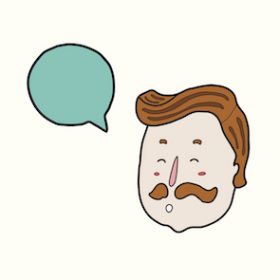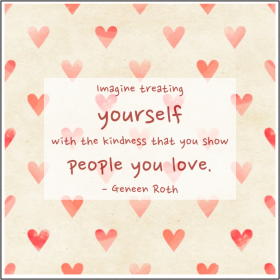Big Fat Lie
Enjoy this article from the archives.
My mother has a name for the elaborate, wrongheaded tales we tell ourselves. She calls them Jack Stories.
Here’s the original: One day, Jack had a flat tire on the side of the road. (This was before spare tires, cell phones, navigation systems, and AAA.) Jack saw a farmhouse in the distance and started walking toward it to ask if he could use the phone to call his son for help. As he got closer to the place, he started telling himself this story: There will be a man home, and he will be mean and nasty and maybe even violent. He will answer the door and ask me what the hell I think I am doing, out in the middle of nowhere, knocking on a stranger’s door. He will assume I am a thief or a louse. He probably won’t care that I have a flat tire. He won’t care about his fellow man. He is probably the kind of guy who kills small animals just for fun. He might even try to beat me up.
Just as he is approaching the front door, Jack thinks: This guy is an absolute menace to society. I would be doing everyone a favor to take him out. Jack raps his knuckles on the door. Hard. Loudly. A man answers. Jack says, “So! There you are! You swine, you pig! Well, take this—!” And Jack punches him in the nose.
Although we usually fall short of punching people, we tell ourselves Jack Stories all day long without realizing it, especially about food and the size of our bodies.
Teaching a workshop recently, I suggested to participants that their cars probably were not the best place to eat if they wanted to truly enjoy their food. Since none of us likes to have our cherished ways of eating emotionally questioned, I was certain that if there were a humane and painless way to shut me up, the group would have done it at that moment. When I asked what they were feeling, one woman said this: “I love eating in my car. When I get some fast food at a drive-through, I feel as if I am not alone. The food keeps me company.”
Food keeps you company. Hmm. “Is that actually true?” I asked. “Do you feel as if hamburgers and french fries actually keep you company?”
“Yes,” she said, “sort of. If I didn’t have the food, I would feel bored and isolated and lonely.” As it turned out, she commuted 150 miles a day to work all by herself, which made her feel pathetic, sorry for herself, and, she admitted, like a total loser — someone who wasn’t smart or clever or good enough to get a job closer to home or a home closer to her job.
And there it was: The Jack Story. There are people who would crave that alone time, cherish it. But she told herself another story: People who drive long distances alone are pathetic losers. And since I do that every day, I am a loser.
If we are telling ourselves that what we are doing makes us sad, abandoned, unloved losers, then we will probably respond to that story by doing something to fix it. By distracting ourselves from what we believe is the truth. By eating.
Between us, the workshop participant and I untangled the Jack Story she was telling about her commute to work. She asked herself if everyone who drives alone is a loser. (Since she didn’t know everyone who drove alone, the answer had to be no.) She asked herself how she felt when she told herself the loser story. (Awful.) She asked herself if she wanted to keep telling the same story, since it wasn’t true. (No.)
Her face brightened when she realized that it was just a story. Now, I said, she could decide whether she actually enjoyed eating in the car, if she tasted the food, if she could sense when she’d had enough. She realized that without the story she was telling herself, she’d rather eat when she wasn’t also trying to steer, stop, and merge into oncoming traffic.
We get so convinced that the horrible Jack Stories we tell ourselves are the absolute truth that we end up eating emotionally. And whereas Jack in the flat-tire story punched the farmer, emotional eating is the way that many of us, in the name of self-care, punch ourselves.
Think for a moment of the various Jack Stories you tell yourself about the size and shape of your body (“it’s lumpy, it’s ugly”); about losing weight (“I have no self-control”); about how happy you will be when you take off those 10 or 20 or 50 pounds (“ecstatic, triumphant, at peace with myself forevermore”).
Now, ask yourself how you feel when you tell yourself Jack Stories. The answer will probably be: miserable, awful, ugly, doomed.
Ask yourself if what you are telling yourself is true. Is it true that your body is ugly? Don’t answer so fast! (I heard you!) Ask yourself to what and whom you are comparing yourself? To a younger version of yourself? To a 20-year-old or an actress who works out three hours a day?
Your body is the piece of the universe you’ve been given, the place where love and joy and grief happen, where happiness unfolds. Do you really want to keep believing that it’s a horrible, ugly, lumpy thing? Do you really want to keep punching yourself like that? (Call me psychic, but I have a feeling that the answer is no.)
When you stop telling yourself Jack Stories about your body, about your eating, about your life, you stop having to eat to fix how awful you feel because you stop feeling awful. Then and only then can you actually figure out what is really true. What you really want. What you really feel. What you really believe.
If you make only one resolution this year, let it be this: that you’ll start questioning your Jack Stories and look for the truth. Ask yourself what would happen if you stopped the incessant chatter about how lumpy or stretchy or ugly your body is. What would happen if, instead, you thanked your body for taking you this far. For schlepping packages and bearing children and making love. Then listen to it carefully to see what it needs.
Maybe it doesn’t want so much sugar. Maybe it wants more rest. Maybe it doesn’t want to eat one-handed in the car. Listen closely, carefully, and, with the utmost kindness, decide if it’s possible for you to put just one of your body’s real wishes into action. When you pay attention to what your body really wants, you won’t have to use deprivation and willpower and force to rein yourself in. You won’t have to make resolutions. When you and your body are on the same side, your actions will be effortless, graceful, and loving.
Jack in the story never considered love or kindness. He never took time to learn the truth. Make that the big difference between him and you.









